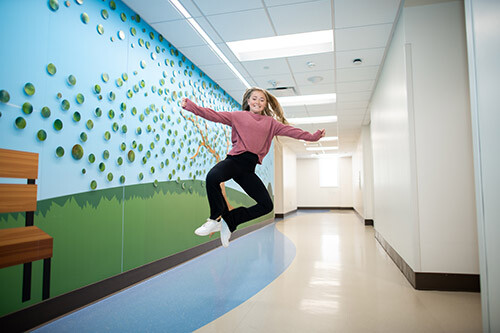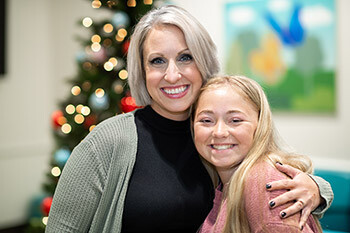
Charley
A second chance at life: Charley receives her second kidney transplant two days before Christmas last year
Some transplanted organs can last for life. The kidney isn't one of them.
Charley and her family have known that ever since she was 2, when a donated kidney saved her life.
"The new kidney basically starts decreasing in function the minute they put it in," Charley's grandmother, Rachelle, said.

Another challenge Charley's family accepted as a lifelong reality: It will become harder to find a donor match with future transplants. That's because with every transplant, Charley's immune system produces antibodies that try to fight off the transplanted kidney, which her body mistakes as an invader.
"That's why she lives on immunosuppression drugs, so her body doesn't wake up and say, 'Hey, that doesn't belong to you,’” Rachelle said.
Charley was born with one healthy kidney, and it took a few months for tests to reveal that her other kidney was not developing.
After a year of close monitoring and no improvement, doctors determined that one of her kidneys was not functioning at all. She would have to get it removed and go on dialysis while waiting for a kidney transplant. But during the surgery at a Louisiana hospital, Charley wound up losing both kidneys.
That night, she was rushed to the Pediatric Nephrology Department at Children's Health℠ in Dallas, where she began dialysis treatment six days a week with a multidisciplinary team of nephrologists, cardiologists, surgeons, nurses, child life specialists, play therapists and others collaborating on the 15-month-old's care around the clock.
"Charley's care team treated her like she was one of their own," Rachelle said. "They've watched her grow up. They pull for kids so hard."
Now 13 years old, Charley is thriving again with her second new kidney given to her by a living adult donor two days before Christmas last year – the ultimate holiday gift.
“I didn’t bring the magic of the holiday season to Charley – I shared it with her. And now, we have this unbreakable bond,” said Rebecca, her second kidney donor, after a six-month check-up.
***
Charley’s second transplant operation was performed by the same surgeon who oversaw her first transplant – Dev Desai, M.D., Ph.D., Chief of Pediatric Transplantation at Children’s Health.

Children's Health offers one of the longest-running comprehensive pediatric transplant programs in the nation. Each year, the program serves approximately 500 patients -- performing somewhere around 50 heart, kidney, and liver transplants -- and helps recipients continue to thrive well after transplantation.
In 2021 the team celebrated a monumental milestone – the performance of its 1,500th transplant since the program’s inception in 1980 – and continues to provide hope and healing for children and families every day.
Dr. Desai, also a Professor of Surgery, Pediatrics and Immunology at UT Southwestern Medical Center, was involved in both transplant procedures – removing the donated kidney from Rebecca’s body at UT Southwestern, placing it in a cooler and driving it a few blocks over to place in Charley at Children’s Health.
The transplant is an example of the collaboration that’s been in place for more than 60 years between Children’s Health – a nonprofit and one of the largest U.S. pediatric health providers – and UT Southwestern, as the two institutions seek to provide incredible health care for children.
“We work together with our partners at UT Southwestern to coordinate the surgeries to start at roughly the same time,” Dr. Desai said. “I’m proud that together, we’re able to give kids an opportunity to live a normal childhood. It’s certainly motivational for me to continue this work and to see patients like Charley grow up. This is why we do this.”
***
Charley's first transplanted kidney lasted her more than 10 years. By the time she had to get it removed, her kidney function had declined so much, she lingered in a state of nearly constant pain.
"I couldn't even walk," Charley said. "It hurt to stand up."
For nearly a year and a half, Charley underwent daily peritoneal dialysis at home – a treatment that uses the lining of the abdomen to filter blood through the body.
In September 2022, she had surgery to remove the kidney and spent the next several months going to Children's Health almost every day for four hours of hemodialysis – a treatment that filters the blood through a machine that acts like an artificial kidney.
Living for months in a hotel was difficult for Charley and her grandmother, who reside several hours away from Children’s Health, but day after day, Charley's medical team worked to provide her the highest quality of care.
The pediatric transplant program includes a renowned team of experts and ancillary services that offer a multidisciplinary approach to care that supports a child's unique physical, emotional, psychological and developmental needs. Together, team members work to provide care to transplant patients that continues to rank the program as one of the top in the country by U.S. News & World Report.
But these team members don’t just care about Charley’s physical needs. They care about her emotional wellbeing, too. They circled around Charley and sang as she got dialysis on her 13th birthday. Raymond Quigley, M.D., her dialysis doctor, paid Charley a special visit during the holidays to play carols on his violin.
Children's Health doesn't just treat the physical issue, they treat the mind, body, soul, emotional health, mental health. … They have a specialty for everything. And it really, really makes a difference.
— Rachelle, Charley's grandmother
Both transplanted kidneys came from living donors with connections to the family's church: the first, Jessica, a high school friend and cheer teammate of Charley's mom; the second, Rebecca, a woman who had moved from Texas to Nebraska.
Rebecca had only met Charley a couple times before moving to Nebraska, when she saw a social media post from a mutual friend sharing that Charley was looking for a new kidney donor and the chances were slim. Quietly on her own, Rebecca began going through the organ donor screening process while living hundreds of miles from Texas, after learning that she and Charley had the same blood type.
“For whatever reason, I could not let this go. I thought about it all the time. I decided there must be a reason that I can’t read about this and forget it,” said Rebecca, a mother of four. “There was a combination of my faith, and that it kept popping up in my head and my heart.”
After a series of surveys and blood tests, Rebecca flew to Dallas for a more in-depth health screening, including interviews with a social worker and psychologist, and other tests to rule out any possible issue that might get in the way of a successful transplant.
Rebecca spent a week with Charley and her family as they got one last step closer to an official greenlight. She cherishes that time, as well as the memory of the life-changing moment when they found out the transplant was official.
"If you didn't know Charley, you wouldn't have known the weight she was carrying," Rebecca said. "I will never forget the look of relief on her face. … Her smile was the most beautiful thing to me."
Charley's second transplant and Rebecca's surgery both went beautifully. The same goes for their recovery. Charley is happy to have more energy, more time to ride her horse Dooley, to swim, and to sleep over at friends' houses — something she hadn't been able to do for a long time because of her treatment.
“Kidney and liver failure are life-threatening illnesses. Without transplant, these patients won’t survive into adulthood, and it’s not because of anything they did,” Dr. Desai said. “Giving these kids an opportunity to live a relatively normal life, which they weren’t given because of something they were born with, is very important to me. We’re giving them a second chance at life.”
***
The extensive screening process living organ donors go through ensures they're healthy enough to give away an organ, and that the organ they're giving away is healthy enough for the recipient. That's one of the reasons organs from living donors last longer than those from deceased donors.
I firmly believe that God gave you a pair so you can share, one kidney for you and one to share.
— Rachelle, Charley's grandmother
Charley and her family are staying in close touch with Rebecca, just as they've done with Jessica for many years -- their extended family now. They share a deep sense of gratitude for one another and hope their story inspires others to give back to Children’s Health, donating to support treatment-advancing research or important services such as child life and social work that holistically care for children like Charley.
Charley will need another transplant someday, which is and isn't a big deal to a girl who has spent her whole life showing up for each new challenge with courage, resilience, and gratitude — qualities that inspire everyone on her medical team.
“Charley has a new lease on life,” Rachelle said. “Sure, it’s a life of medications, labs and restricted diets. But it’s a second life, and it’s amazing.”
Kids count on us. We count on you.
Give to support innovative research, lifesaving treatments and compassionate care.
Did you enjoy this story?
If you would like to receive an email when new stories like this one are posted to our website, please complete the form below. We won't share your information, and you can unsubscribe any time.

